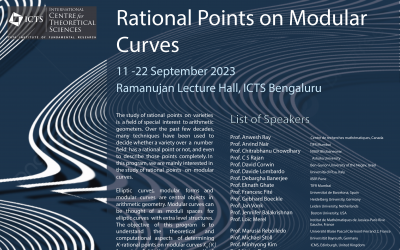The study of rational points on varieties is a field of special interest to arithmetic geometers. Over the past few decades, many techniques have been used to decide whether a variety over a number field has a rational point or not, and even to describe those points completely. In this program, we are mainly interested in the study of rational points on modular curves.
Elliptic curves, modular forms and modular curves are central objects in arithmetic geometry. Modular curves can be thought of as moduli spaces for elliptic curves with extra level structures. The objective of this program is to understand the theoretical and computational aspects of determining $K$-rational points on modular curves $X_H(K)$ for various fields $K$ and subgroups $H$ of $\mathrm{GL}_2(\mathbb{Z}/N\mathbb{Z})$ for any natural number N.
In the mini-courses, we give an advanced introduction to the theory of rational points on modular curves, under both theoretical and computational aspects. These courses would include an introduction to the geometry of modular curves, their $\mathbb{Q}$-rational points, classical and non-abelian Chabauty methods, and related computational aspects. We also attempt to strike a balance between the more advanced topics and the down-to-earth examples.
In the discussion meeting, we wish to bring many experts across the world in the area of arithmetic geometry together to share their ideas and the current state of research that will facilitate future research in this direction. We strongly encourage participation of young researchers.
Accommodation will be provided for outstation participants at our on campus guest house.
Eligibility criteria: Candidate should have already enrolled for PhD (2nd year or above) or completed PhD in Number Theory or Arithmetic Geometry. Interested postdocs/faculty members from these areas are welcome to register. Any interested BS/BSc/BTech/MSc/MS/MTech students of Mathematics can also apply.
ICTS is committed to building an environment that is inclusive, non-discriminatory and welcoming of diverse individuals. We especially encourage the participation of women and other under-represented groups.
 icts
icts res
res in
in

